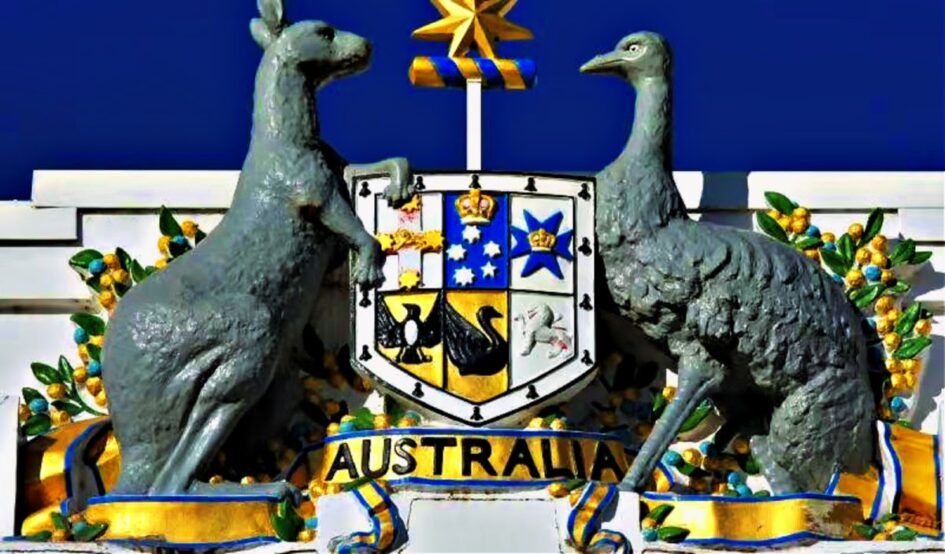By Richard Kelly: Brownstone Institute.
John Stapleton’s incredible new book Australia Breaks Apart has a surreal quality to it. He taps into the dissonance, the discord, and the disillusionment of those among us who were able, or who dared, to step outside the wall-to-wall propaganda and look at it in real time, or back at it later, in horror.
Through the book’s central character, Old Alex (a retired journalist, coincidentally just like the author), wave after wave of recognition and acknowledgement of pain and anguish and confusion and foreboding wash over the reader, like a soothing balm for the still raw wounds inflicted by our political leaders. It’s just as well – in between the passages where we crawl inside Old Alex’s head, and hear and feel the visions and the dreams for a country so utterly changed, Stapleton catalogues in excruciating detail the things that were done to us. It’s confronting.
Some of the things I knew about, many others I didn’t, thanks to the suffocating censorship of our complicit mainstream media. Still others I knew about, but had tried to forget.
Reading it is like reading Solzhenitsyn’s The Gulag Archipelago – page after page of open-mouthed shock at the things humans can do to one another and the things that power can corrupt. It’s un-put-downable and un-pick-upable at the same time.
It’s essential reading for the dissident, the disenfranchised, the disillusioned. We’re not alone, our eyes were not deceiving us, it was not all just a nightmare from which we will one day wake up. It actually happened. Its legacy will be a millstone Australia will carry for decades. This book won’t make up for the tragedies of lives and livelihoods shattered by wilfully stubborn governments and petty tyrants, but it will certainly help.
Lots of the names and sources will be familiar to the covid dissident – among them McCullough, Malone, RFK, Jr, Naomi Wolf, Rebecca Weisser, Paul Collits, Avi Yemini…the roll call of those we’ve relied on to get an honest point of view.
But helpful as it is for the victims and the protesters to have this book, those who need to read it the most will find it hard going. The laptop class, the ones who learned a new recipe for sourdough, or how to crochet, while truckies and cashiers from the indentured servant class waited on their every need – they are the ones who need to read this book.
The ones who happily observed that the traffic was lighter and the carbon dioxide lower, while mourners grieved alone, banned from attending the funeral. Every single nurse who made a dance video. Every jab clinic manager tallying the day’s injectees and calculating the bonus incentive payment.
What pangs of self-recognition will they find when they read of humans mistreating each other? If they don’t feel any then they could read the whole thing and not be any the wiser, or indeed could take whatever message they want to take from it. If they do feel the pangs of shame, it will take a heroic effort of acceptance and repentance to get through to the end.
There will even be some, the scoffers who only consume a vegan ‘news’ diet from the ABC or the free-to-air presstitutes, who will find the cognitive dissonance simply too much to deal with and toss the book away in anger and disgust. Some of this group would literally never have heard of the Canadian Trucker protest or the Hancock WhatsApp messages scandal, such was the media silence.
Let’s assume some of that group do read it. Where will they find themselves afterwards? My guess is that they will find themselves looking for a scapegoat, an excuse, ‘extenuating circumstances,’ to cover their shame. Alas, none will be found.
Where will a bookstore put this book, among the shelves of thrillers, cookbooks, and travel guides?
Psychology? Self-help? A good case can be made. It explains our distress, it pushes us on, gives us courage. The treatment of the Canberra protests, disgracefully ignored by the mainstream media, provides the cameos of mateship, love, openness, happiness, togetherness, and fearlessness that we so craved when imprisoned, and which our overlords sought to extinguish.
Politics, History? For sure. It’s got a much better claim to be a document of record than any of our newspapers have of being a ‘paper of record.’ The author’s distaste for his former profession rises off nearly every page like bile rises in the throat. Likewise contempt for the political class, and the unelected petty tyrants masquerading as health bureaucrats.
Religion? Fantasy? It sits comfortably alongside CS Lewis’ That Hideous Strength, whose villains thought they could create a new Man, a literally disembodied head, controlled by those at the top. Villains who commanded a private police force in service of a ‘scientific’ institution; who orchestrated the stories to appear in the press and coerced the journalists to write the lies and the propaganda.
Villains who wrought destruction on an innocent English village and its residents. Stapleton’s book is likewise a tale of supreme political hubris and arrogance, enough arrogance to imagine that a riot squad can control an airborne virus. Lewis brought in the gods to resolve the finale; Stapleton, too, brings the supernatural out into the open, spirits portentously looming over the future of our once free land.
If it were up to me, I know where it belongs, apart from on the New Releases and Best Sellers shelves.
True Crime.
Read it, before you are tempted to ‘move on.’
Buy it, before they ban it.


